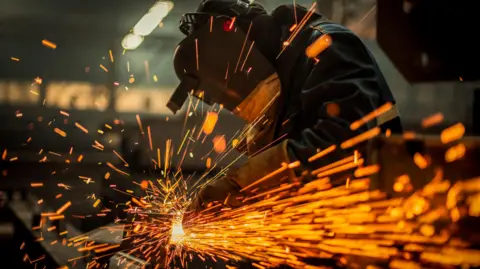Nippon and US Steel are suing the government over the blocked deal

 Getty Images
Getty ImagesNippon Steel and US Steel have sued the US government for blocking the takeover, saying President Joe Biden “disregarded the law to curry favor” with labor unions.
The two companies also alleged that Biden, who is entering the final weeks of his presidency, stopped Nippon Steel from buying US Steel to further his political agenda.
By rejecting the proposed agreement on FridayPresident Biden said a strong domestic steel industry is critical to national security and strong supply chains, including the auto and defense industries.
If the $14.9bn (£11.8bn) takeover goes ahead, it will strengthen Nippon’s ability to compete with China, which produces 60% of the world’s steel.
The White House defended the decision, saying foreign ownership of US Steel posed a national security risk.
The takeover has been in limbo since it was first announced in December 2023.
Biden’s decision to formally block a deal made on a political promise he made in last year’s election — US Steel is based in Pennsylvania — despite concerns that it could hurt foreign investment and strain relations with Japan, a key ally.
Nippon Steel and US Steel said Biden voiced his opposition before a formal review of the government procurement began, in an effort to “lobby” the union during his re-election bid.
They asked the court to order a new review, saying the process overseen by the Committee on Foreign Investment in the US, which has the power to examine foreign takeovers of American firms, “forgot” to support Biden’s position.
“Due to President Biden’s undue influence to advance his political agenda, the Committee on Foreign Investment in the US has failed to conduct a good faith, safety-focused regulatory review process,” Nippon Steel and US Steel said.
Additionally, the companies are suing the president of the United Steelworkers union, David McCall, and the CEO of rival steel company Cleveland-Cliffs, Lourenco Goncalves, for their “unlawful and systematic actions aimed at obstructing transactions”.
Mr McCall, who backed the Cleveland Cliffs’ $7.3 billion takeover offer in the summer of 2023, said the allegations were “baseless” and reiterated his support for Biden’s decision.
“By blocking Nippon Steel’s bid to acquire US Steel, the Biden administration has protected vital American interests, protected our national security and helped preserve the domestic steel industry that supports our nation’s vital supply chains,” he said.
Nippon Steel and US Steel said they “engaged in good faith with all parties” to demonstrate how the deal would “enhance, not threaten, US national security” and how it would strengthen America’s domestic steel industry “to counter the threat from China”.
They also emphasized that Nippon is willing to invest $2.7bn in Pittsburgh-based US Steel.
Earlier on Monday, Japanese Prime Minister Shigeru Ishiba expressed his concern over the US decision to block the takeover and the possible impact it would have on trade relations between the two G7 countries.
“Unfortunately, it is true that we have heard the concerns expressed by the Japanese industry regarding future investment between Japan and the US. We must take this matter seriously,” said Mr. Ishiba.
He added that although it is not appropriate for his government to comment on individual companies: “We must insist on the explanation of why there are security problems, otherwise there will be no progress in future negotiations.
Since 1990, the US has blocked only eight takeover deals — most in the past decade and involving Chinese firms.
The case could leave the finality of the deal in the hands of the next administration, with some experts saying it could get a second hearing at best.
But President-elect Donald Trump has also said he will block the deal. On Monday, he wrote on Truth Social: “Why would they want to sell US Steel now when the prices will make it a very profitable and valuable company?”
Trump has said he plans to end sweeping tariffs, which make US imports more expensive.
He said that these measures, which he used in his first term, will make it easier for American-based companies to compete with overseas competitors and stimulate the growth of production, increasing the demand for steel.
According to the economic survey, the prices of foreign metals that were revealed in 2018 led to small job gains for steel makers but lost jobs to other manufacturing companies that were forced to face higher steel costs.
Source link



